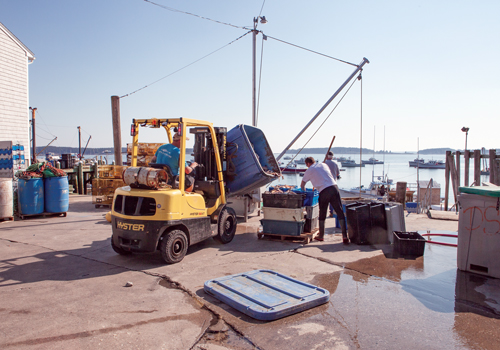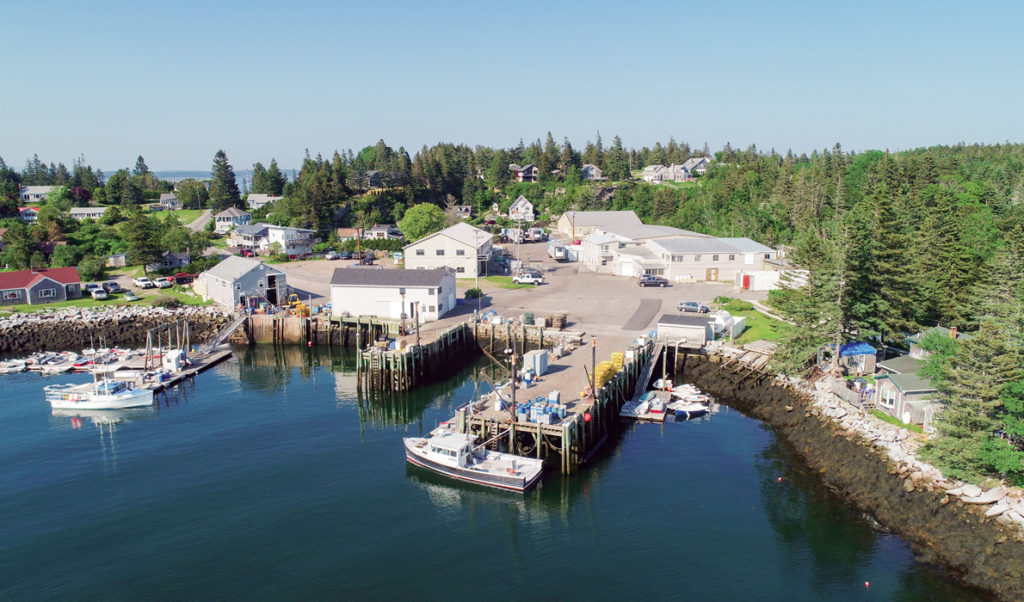The Land for Maine’s Future Board has selected six projects that will help protect and sustain Maine’s working waterfront.
Through the Working Waterfront Access Protection Program, funds have been set aside to purchase development rights, through a legally binding agreement between the state and working waterfront owners, which will ensure that the property remains available to support commercial fishing or aquaculture activities.
Stonington Co-op in Stonington has received a preliminary allocation of $216,250 under the program. The funds will be used to conduct site work which will improve shipping and receiving of lobsters and bait.
The co-op’s plans include the construction of a 2,000-square-foot wharf that will allow boats to unload light gear and will provide 12 additional parking spaces. The site currently supports 40 fishing vessels that harvest lobster and scallops and the expansion will also allow the co-op to provide additional shoreside resources for aquaculture operations.
The town of Jonesport, home to 500 commercial fishermen, has received a preliminary allocation of $118,750 which it will use for site design and engineering, access road and parking development, and installation of a boat ramp and two floats at Henry’s Point, currently the location of a campground.
 The site will continue to support recreational activity, but its development as a commercial site will relieve pressure on a nearby state-owned marina, which provides the only public boat access in Jonesport.
The site will continue to support recreational activity, but its development as a commercial site will relieve pressure on a nearby state-owned marina, which provides the only public boat access in Jonesport.
Wotton’s Lobster Wharf in New Harbor plans to use funds awarded by the LMF Board to install an above ground fuel tank, additional bait storage, and a new float with lobster crate storage at its Southside Road, New Harbor location.
Wotton’s Wharf is currently used by four vessels year-round for lobster and bluefin tuna fishing. By improving infrastructure, the project offers the potential to add four additional full-time fishing crews and vessels. Their preliminary allocation totals $68,750.
A preliminary allocation of $301,500 has been given to the Boothbay Region Maritime Foundation which it will use for the demolition and reconstruction of Carter’s Wharf on Atlantic Avenue in Boothbay Harbor. Carter’s Wharf is home to 30 lobster fishing vessels and a lobster buying station run by Luke’s Lobster. The new wharf could potentially serve an additional 10-15 vessels as well as aquaculture operations and allow other types of fish to be landed including crab and tuna.
Lobster co-op Interstate Lobster, Inc. in Harpswell will use funds allocated by the LMF board to support the demolition, replacement, and expansion of the existing wharf on Ash Point Road.
The project will improve the structural integrity of the wharf, built in 1978 and suffering from cracked and split underpinnings which have cost the co-op $10,000-$30,000 per year to maintain. The wharf supports 21 co-op members and 20 additional boats that land lobsters, scallops, and menhaden. The preliminary allocation totals $155,000.
The Spruce Head Fisherman’s Co-op on Island Road in South Thomaston will use the $276,000 allocated by the board to pay off a loan used to purchase adjacent property, which will be used to expand parking and storage for the co-op’s 54 members. The co-op will then refinance the property and use the money to install a bait freezer which will help the members address potential bait shortages.
Preliminary allocations represent LMF board support for the projects, however, before funds are disbursed, applicants must submit an appraisal and complete all real estate due-diligence to the satisfaction of the state.
The Working Waterfront Access Protection Program is part of the Land for Maine’s Future Program. The Working Waterfront Access Protection Program fund was first capitalized by a bond passed in 2005 and has been renewed three times since by Maine voters. Funds are allocated by the LMF Board to support projects that sustain access to the waterfront for commercial fishing and aquaculture in exchange for development rights through a legal document called a Working Waterfront Covenant. To date, 25 properties have received funds through the program.
The program is administered by the Maine Department of Marine Resources and the Land for Maine’s Future Program.
More information on the program can be found at https://www.maine.gov/dacf/lmf/publications.shtml#wwapp





